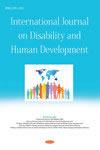Perceived parental differential treatment, cognition, behaviour and family cohesiveness among siblings of children with cerebral palsy? A family-mediated intervention to understand “displaced” children
International Journal on Disability and Human Development
Pub Date : 2016-08-01
DOI:10.1515/ijdhd-2015-0008
引用次数: 1
Abstract
Abstract The present study adopts a quasi-experimental design to evaluate the impact of perceived parental differential treatment towards 30 non-disabled siblings of children with cerebral palsy 7–10 years of age. Standardised inventories such as, the Stanford-Binet Intelligence Test (SBIT), the Connors Parent Rating Scale-Revised (CPRS) and the Draw-a-Family test were used pre and post intervention. Scheduled interviews were used for parents and children to obtain information regarding family cohesiveness. A special program was designed to structure the home environment and to maximise parental involvement that catered to the “needy child” and this was implemented for 6 months after which the children were reassessed. Prior to the intervention, we observed deficits in cognitive skills and siblings had concerns in hyperactivity and oppositional behaviour. Scheduled interviews with siblings elicited responses that represented neglect, perceived differential treatment and negative emotional well-being. Projective tests revealed that family dynamics were disturbed and chaotic. Post intervention, we observed significant differences in the cognitive orientation, behavioural engagement and also in the interpersonal relationship within the family. We may conclude therefore, that parental involvement significantly predicts academic and psychosocial adjustment of siblings and this is an important implication for practitioners in developing early intervention programs.脑瘫患儿兄弟姐妹间感知到的父母差别对待、认知、行为和家庭凝聚力?以家庭为中介的干预来理解“流离失所”儿童
摘要本研究采用准实验设计,对30名7 ~ 10岁脑瘫儿童的非残疾兄弟姐妹进行感知父母差别待遇的影响进行了研究。在干预前后分别使用了标准化量表,如斯坦福-比奈智力测验(SBIT)、康纳斯父母评定量表(CPRS)和家庭抽取测验。对父母和孩子进行预定的访谈,以获取有关家庭凝聚力的信息。设计了一个特殊的方案来构建家庭环境,并最大限度地提高父母的参与,以满足“有需要的孩子”的需要,该方案实施了6个月,之后对儿童进行了重新评估。在干预之前,我们观察到认知技能的缺陷,兄弟姐妹有多动症和对立行为的担忧。与兄弟姐妹的定期访谈引发了代表忽视、感知差别待遇和消极情绪健康的反应。投射测试显示,家庭动态受到干扰和混乱。干预后,我们观察到认知取向、行为参与以及家庭内部人际关系的显著差异。因此,我们可以得出结论,父母的参与可以显著地预测兄弟姐妹的学业和心理社会适应,这对于制定早期干预计划的从业者来说是一个重要的暗示。
本文章由计算机程序翻译,如有差异,请以英文原文为准。
求助全文
约1分钟内获得全文
求助全文

 求助内容:
求助内容: 应助结果提醒方式:
应助结果提醒方式:


